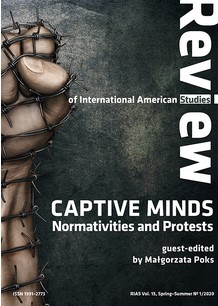Posthumanity and Prison-House of Gender in Douglas Coupland’s Microserfs
Posthumanity and Prison-House of Gender in Douglas Coupland’s Microserfs
Author(s): Murat Göç-BilginSubject(s): Gender Studies, Other Language Literature, Social Theory, Theory of Literature
Published by: Wydawnictwo Uniwersytetu Śląskiego
Keywords: Douglas Coupland; Microserfs; posthuman; cyborg theory; gender;
Summary/Abstract: This article aims to analyze Douglas Coupland’s Microserfs with a deliberate emphasis on posthuman theory, body politics, and gender to construe the transformation of the human body, human-machine nexus, and captivity in inhumanity with a struggle to (re)humanize minds and their bodies. One of the arguments of the paper will be that posthumanism offers a new outlet for breaking the chains of captivity, that is, escaping into non-human to redefine humanity and to emancipate the human mind and human body to notch up a more liberated and more equitable definition of humanity. As gender and sex are further marked by the mechanical and mass-mediated reproduction of human experiences, history, and memory, space and time, postmodern gender theories present a perpetual in-betweenness, transgression and fluidity and the dissolution of grand narratives also resulted in a dissolution of the heteronormative and essentialist uniformity and solidity of the human body. Gender in a posthuman context is characterized by a parallel tendency for reclaiming the possession of the body and sexual identity with a desire to transform the body as a physical entity through plastic surgery, genetic cloning, in vitro fertilization, and computerization of human mind and memory. Therefore, the human body has lost its quality as gendered and sexed and has been imprisoned in an embodiment of infantile innocence and manipulability, a “ghost in the machine,” or a cyborg, a hybrid of machine and organism (Haraway). The human-machine symbiosis, then, is exteriorized and extended into a network of objects switching “natural human body” to an immaterialized, dehumanized, and prosthetic “data made flesh.” In this regard, Coupland’s Microserfs boldly explores the potential of posthuman culture to provide a deconstruction of human subjectivity through an analysis of human and machine interaction and to demonstrate how human beings transgress the captivity of humanity by technologizing their bodies and minds in an attempt to become more human than human.
Journal: Review of International American Studies
- Issue Year: 13/2020
- Issue No: 1
- Page Range: 197-214
- Page Count: 18
- Language: English

